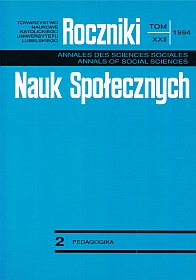Variables of the Educational Success of the Boarding-school a Model of the Boarding-school Educator in the Pupils’ Expectations
Abstract
The article undertakes an analysis of the conditions in which the boarding-school as an educational-tutelary institution works. Special attention is paid to the interdependence between the features actually perceived by the pupils and those expected by them from the educators. The analysis undertaken in the article are made on the basis of studies of two groups of subjects: pupils (girls) staying in a state run boarding-school and in a private one run by nuns. The results of the studies of this population do not generally reveal significant differences between the description of the educators given by the pupils (by choosing features from a suggested set) and their expectations, i.e. the so-called desired model. A relatively high level of convergence between the features perceived in the educators and those expected by the pupils has been found. Also the results are not significantly different in the two studied groups. A more thorough interpretation of the state that was found is not undertaken in the article - suggestions point to conditionings related to the level or type of needs felt by the pupils and to the way they see the educational relation. The differences that are perceived may result from a slightly different criterion of appraisal used especially with respect to the nuns-educators as well as from the type of environment from which the girls come and from their motivation for the chioce of the given type of boarding-school.
The particular aspect taken into consideration in the studies and in the analysis, i.e. the expected and actual model of the boarding-school educator, may be treated as a possible variable of efficiency or even of educational success in such a specific type of institution as the boarding-school.
References
Bahura W.: Wychowanie w internacie. Lwów 1938.
Grądzki W.: Uwarunkowania efektywności oddziaływań opiekuńczo-wychowawczych w internatach. Próba diagnozy. Białystok 1990.
GrądzkiW.: Wychowawca − wychowanek w internacie: innowacyjna próba relacji. Białystok 1990.
Gurycka A.: Podmiotowość w doświadczeniach dzieci i młodzieży. T. 1. Warszawa 1984.
Janowski A.: Poznawanie uczniów. Warszawa 1985.
Kowalik K.: Wychowanie w internacie: wybrane zagadnienia. Warszawa 1975.
Łobocki M.: Ideał moralny i wzór osobowy w procesie wychowawczym. „Lubelski RocznikPedagogiczny” 11:1983 s. 59-68.
Makowski A.: Wychowanie innowacyjne w internacie. [Poradnik]. Warszawa 1988.
Matuszczak A.: Samorządność w internacie Prywatnego Liceum Ogólnokształcącego. „Problemy Opiekuńczo-Wychowawcze” 1991 nr 5 s. 223-227.
Mickunas J.: Ich drugi dom. Warszawa 1963.
Moskal F.: Próba określenia aktualnego i przyszłościowego modelu opiekuna − wychowawcy.Częstochowa 1977.
Okoń W.: Osobowość nauczyciela. Warszawa 1959.
Poradnik wychowawcy internatu. Pod red. W. Grądzkiego. Białystok 1987.
Przetacznikowa M.,Włodarski Z.: Psychologia wychowawcza. Warszawa 1983.
Raczkowska J.: Rozwój zawodowy wychowawcy. „Problemy Opiekuńczo-Wychowawcze”1990 nr 8 s. 279-283.
Słownik pedagogiczny. Pod red. W. Okonia. Warszawa 1984.
Szczepański J.: Socjologiczne zagadnienia wyższego wykształcenia. Warszawa 1963.
Szczodrak M.: Wychowawca w internacie. Kielce 1982.
Szkoły eksperymentalne w świecie 1900-1960. Pod red. W. Okonia. Warszawa 1964.
Węgierski Z.: Funkcje internatów szkolnych. Warszawa 1980.
Węgierski Z.: Internat jako środowisko wychowawcze. Warszawa 1979.
Węgierski Z.: Internat szkolny. Geneza, rozwój i problemy pedagogiczne. Bydgoszcz 1984.
Wojtański W.: Metody i wyniki badań pedeutologicznych. „Ruch Pedagogiczny” 1964 nr4 s. 5-11.
Żebrowska M.: Psychologia rozwojowa dzieci i młodzieży. Warszawa 1969.
ŻulińskaB. CR: Ku Zmartwychwstaniu (Zagadnienia pedagogiczne). Nowy Jork 1947.
Copyright (c) 1994 Roczniki Nauk Społecznych

This work is licensed under a Creative Commons Attribution-NonCommercial-NoDerivatives 4.0 International License.


